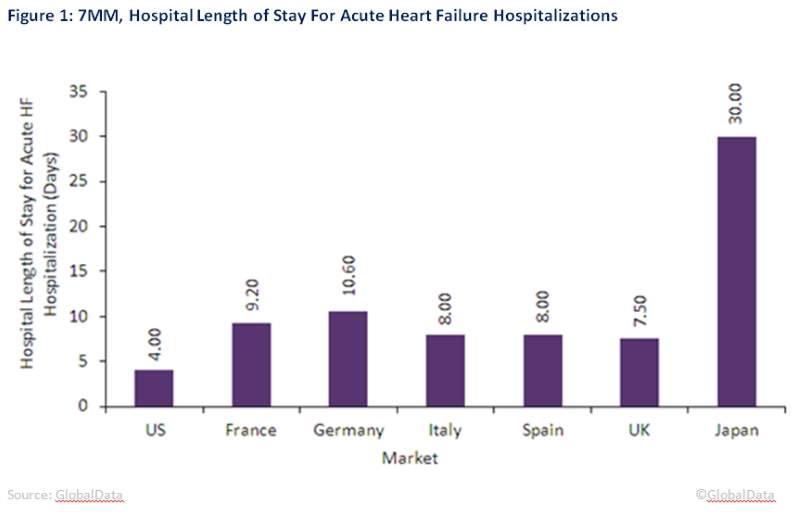Acute heart failure (HF) often requires hospitalization. The length of hospital stay for heart failure is determined by the severity of the illness and the resources available for treatment. Globally, the length of hospitalization differs, with Japan leading in length of hospital stay at 30 days.
GlobalData epidemiologists conducted an analysis of hospital length of stay in the seven major markets (7MM: US, France, Germany, Italy, Spain, UK, and Japan) sourcing published peer-reviewed studies. Figure 1 presents the hospital length of stay for acute HF hospitalization in the 7MM. The US had the shortest length of stay for acute HF, while Japan had the longest.
How well do you really know your competitors?
Access the most comprehensive Company Profiles on the market, powered by GlobalData. Save hours of research. Gain competitive edge.

Thank you!
Your download email will arrive shortly
Not ready to buy yet? Download a free sample
We are confident about the unique quality of our Company Profiles. However, we want you to make the most beneficial decision for your business, so we offer a free sample that you can download by submitting the below form
By GlobalDataHF is a condition in which the heart is unable to pump out enough blood to meet the needs of the body. Acute HF is a form of HF that happens due to either a slow or fast change in HF signs and symptoms, where the patient needs to be hospitalized immediately.

HF commonly occurs in people older than 50 years of age, and the severity of the disease gets worse with age. Eventually, without the heart’s pumping action to deliver oxygen and nutrient-rich blood to the cells, fatigue, shortness of breath and coughing results. Even everyday activities such as walking, climbing stairs, or carrying weight can become tedious. Acute HF symptoms result from severe pulmonary congestion requiring immediate treatment in a hospital.
Sato and colleagues reported the length of stay for acute HF in Japan to be 30 days based on the ATTEND registry, although they were unclear on what the driving force of the long hospital stay in Japan actually is. They noted that it may be possible for the HF space to see improvements in cost of care and patient outcomes by implementing shortened hospital stays. However, the same researchers also believe that any hospital stay of less than seven days is too short, as most cases of HF mortality occur within 14 days after admission.
Related Reports
GlobalData (2017). EpiCast Report: Heart Failure – Epidemiology Forecasts to 2026.









